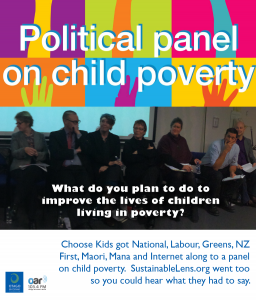
Clare Curran is the MP for Dunedin South. She tells us that Labour has a core set of values that sees the people and the planet as intertwined.
An important part of her value set is the role of strong communities – geographical and communities of interest. How a country relates to communities determines what sort of country it is – looking at us as a set of businesses is a very dehumanising approach as it looks at work only in terms of how much profit it makes rather than the value of the interaction in your whole life. This whole life approach isn’t about business, it’s about how we live.
In addition to food, shelter, education and health she includes access to the internet as an essential service. The internet is seen as an enormous leveller but she points to 100,000 homes in NZ where kids don’t have access to a computer – their ability to participate in society as children is already compromised. She fears an entrenching of the digital divide – “digital apartheid” in its effect – determining access by wealth could be one of the worst decisions of the next 50 years. If the kids without computers get to high school without reliable access then their futures are seriously compromised. She describes collective responses to this challenge.
The role and responsibilities of big business, both state owned and commercial sector – and the different implications of monopolies within them. The state owned monopolies are there for a purpose because as a society we’ve decided that either the sector isn’t big enough to support competing interests or it has an essential nature. She says TVNZ isn’t a public broadcaster any more.
In a wide ranging interview we talk about: weightless exports; the prospects for open transparent government; investing in rail and increasing emphasis on public transport; procurement policies that account for long term effects, labour cost and environmental effects; open source. We discuss the digital copyright act. In an advance on a policy annoucement Clare tells us that Labour will not only repeal the termination clause, but review the whole fraught are of intellectual property with a view to enable access rather than prevent it.
Clare is the Labour Party spokesperson for Broadcasting, Communications and Information Technology. She trained as a journalist and has worked for companies such as Social Change Media, and Essential Media Communications. She has served on the board of Greenpeace.
Shane’s number of the week: 9.1% is the rise in the cost of living for a solo parent according the Salvation Army’s low income CPI.
Sam’s joined-up-thinking: 550 mostly students filled the St David’s St lecture theatre for Generation Zero‘s “Cheer Up Bob” event. Professor Bob Lloyd gave a depressing lecture (peak oil has happened; it is linked with climate change which is already having impacts; coal is rampant but it too will peak; the underlying problem is an irrational obsession with growth). Jeanette Fitzsimons responded via Skype with an inspiring message of hope and positive action.





